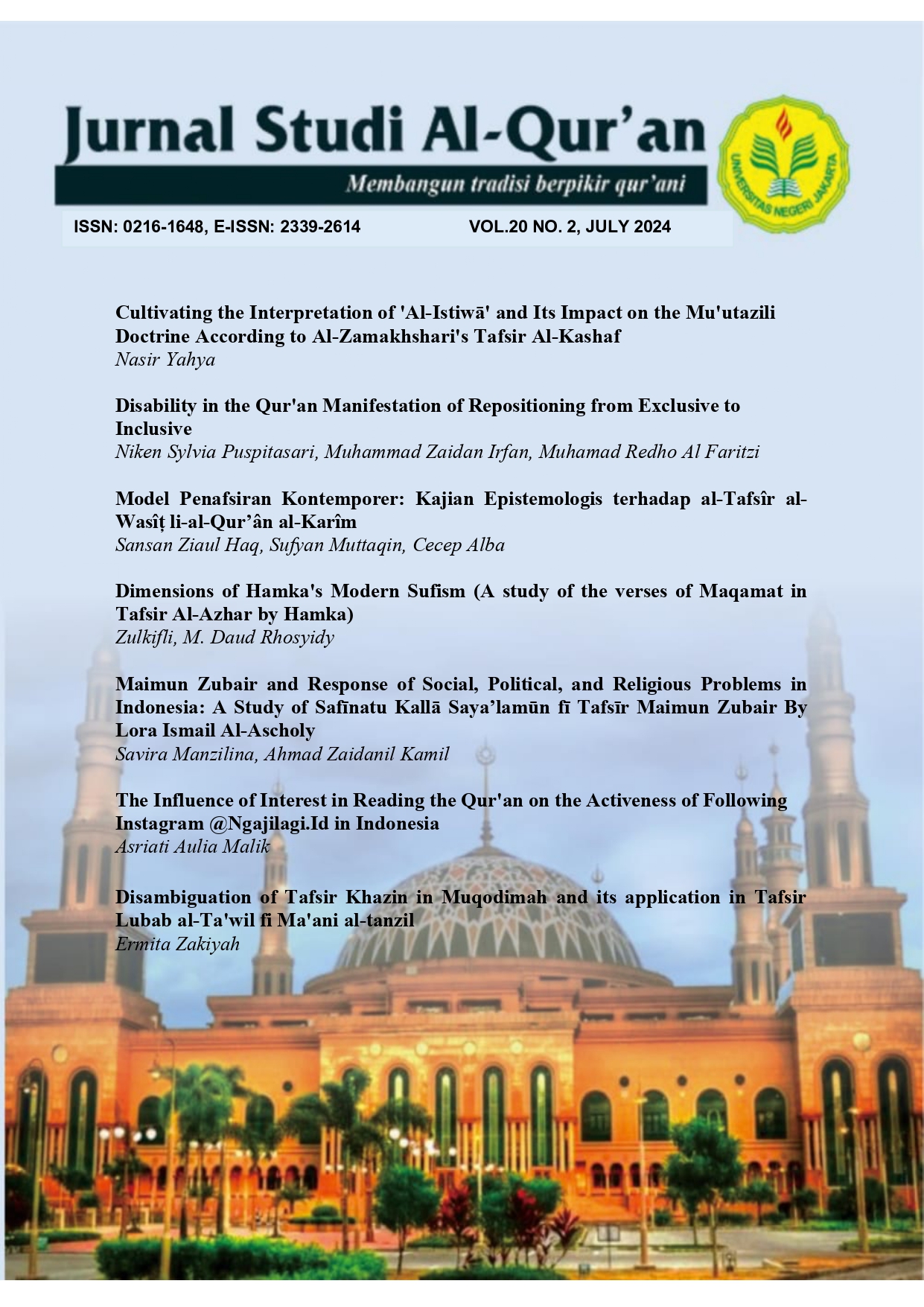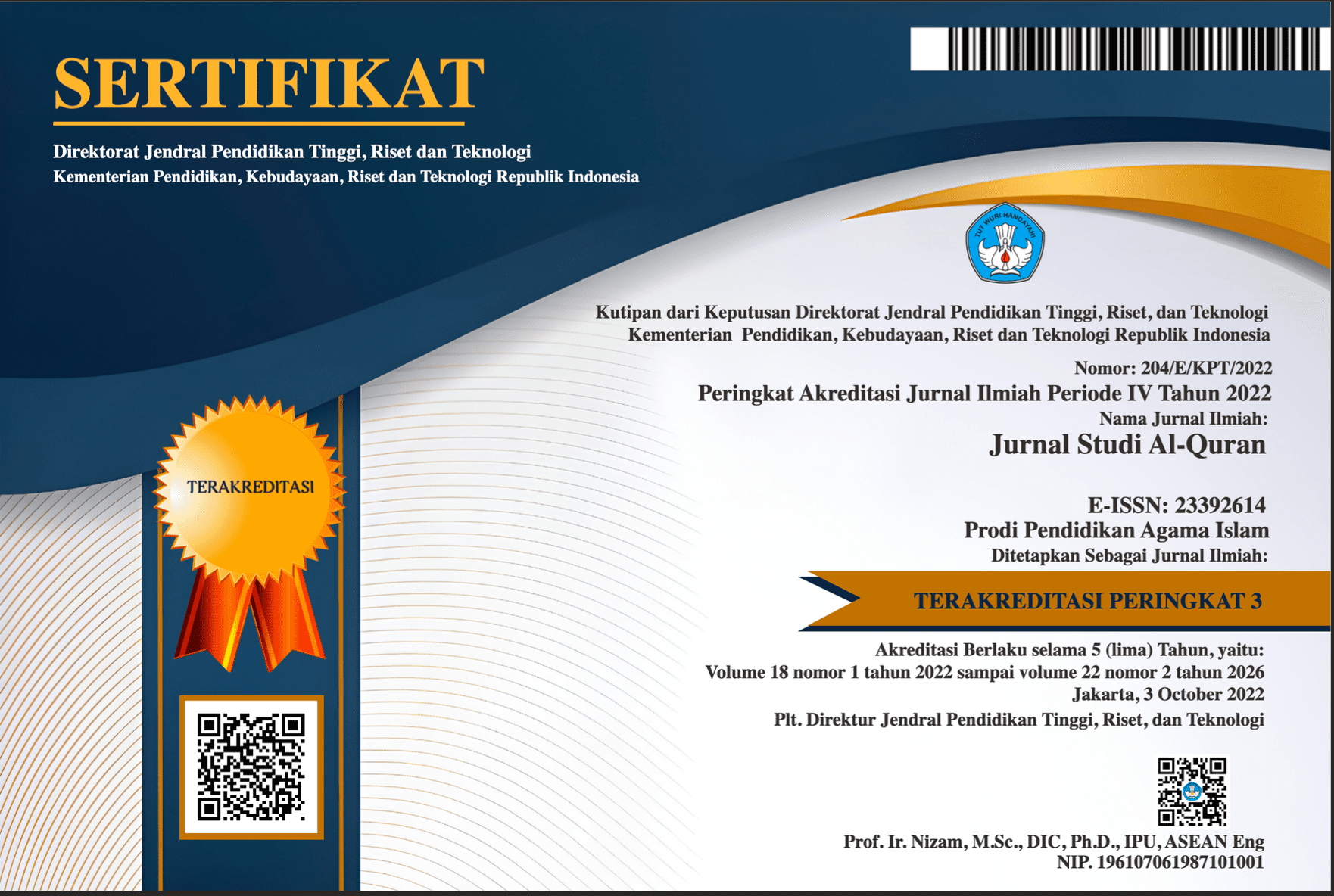Dimensions of Hamka's Modern Sufism (A study of the verses of Maqamat in Tafsir Al-Azhar by Hamka)
DOI:
https://doi.org/10.21009/20.2.04Keywords:
Sufism, Hamka, Maqâmât, Interpretation of al-AzharAbstract
Seeing the reality of today's society, moral degradation has arisen in humans, so it is essential to improve ourselves by returning humans to their existence as servants of Allah SWT. One alternative is to study and practice the teachings of Sufism. In the teachings, there are spiritual stages (maqâmât) to achieve perfection as a servant of Allah. The focus of this research is to examine Hamka's interpretation style in al-Azhar's tafsir by explaining his interpretation regarding the maqâmât verses so that the dimensions of Sufism and its relevance found in Hamka's al-Azhar tafsir are known. This research aims to find out Hamka's style and interpretation in al-Azhar's interpretation regarding the maqâmât verses and the dimensions of Sufism contained in them so that we can find out whether maqâmât is still relevant or not to be practiced in the present era. The methodology used in this research is qualitative library research (library research) with a mauḍu'i model of the Sufism approach that focuses on maqâmât verses using descriptive-analytical analysis of Hamka's Sufism thought. The results of this discussion show thatHamka's interpretation of the verses of maqâmât is in the style of Sufism by exploring the meaning of zahir and theinner meaning in which there are nuances to society (Adabi Ijtima'i) covering the socio-culture of Indonesianculture so that the dimension of Sufism contained in Hamka's interpretation is still very relevant to modern lifetoday.
References
Aceh, Aboe Bakar. Pendidikan Sufi: Sebuah Upaya Mendidik Akhlak Manusia. Semarang: CV. Ramadhani, 1985.
Ahmad Anwar, Muhammad. Prinsip Metodologi Research. Yogyakarta: Sumbangsih, 1976.
Ali, Mukhtar H. “Repentance and the Return to God: Tawba in Early Sufism, Written by Atif Khalil,” 30 Juni 2021. https://doi.org/10.1163/22105956-12341323.
Amir, Ahmad Nabil, dan Tasnim Abdul Rahman. “HAMKA’S QURAN EXEGESIS AND ITS THEORETICAL FOUNDATION.” Malaysian Journal of Islamic Movements and Muslim Societies 1, no. 2 (2021): 1–19.
Anshori, M Afif, Zaenuddin Hudi Prasojo, dan Lailial Muhtifah. “Contribution of sufism to the development of moderate Islam in Nusantara.” International Journal of Islamic Thought 19, no. 1 (2021): 40–48.
Arifin, Syamsul, Muhammad Wahyudi, dan Muh Mustakim. “Political Leadership Among Religious Minorities: A Study of the Books Tafsir Al-Azhar and Tafsir Al-Misbah on The Non-Muslim President.” Al-Ulum 21, no. 1 (2021): 1–26.
Badri, Khairul Nizam Bin Zainal, dan Hari Krishnan Andi. “Sufi Education Efforts in the Development of Modern Psychology.” HIKMATUNA 6, no. 1 (15 Juni 2020): 12–24. https://doi.org/10.28918/hikmatuna.v6i1.2195.
Bagus Nasution, Ahmad, dan Rayani Hanum Siregar. Akhlak Tasawuf: Pengenalan, Pemahaman dan Pengaplikasiannya. Jakarta: PT Rajagrafindo Persada, 2013.
Baltabayeva, Malokhat, dan Dilshodakhon Kodirova. “The need to provide the priority of spiritual and educational processes in the modern education system.” ACADEMICIA: An International Multidisciplinary Research Journal 12, no. 1 (2022): 423–27.
Büssing, Arndt, Yvonne Beerenbrock, Mareike Gerundt, dan Bettina Berger. “Triggers of spiritual dryness–results from qualitative interviews with religious brothers and sisters.” Pastoral Psychology 69 (2020): 99–117.
Dahri, Harapandi, dan Muhammad Rosadi. Kajian Naskah Klasik Keagamaan Bidang Tasawuf: Menyibak Ajaran Tasawuf dalam Naskah Klasik. Jakarta: Maloho Jaya Abadi Press, 2010.
Daud, Ilyas. “Quranic Exegesis as Social Criticism: The Case of Tafsir al-Azhar.” Ulul Albab 21, no. 1 (2020): 24.
Dwivedi, Yogesh K., D. Laurie Hughes, Crispin Coombs, Ioanna Constantiou, Yanqing Duan, John S. Edwards, Babita Gupta, Banita Lal, Santosh Misra, dan Prakhar Prashant. “Impact of COVID-19 pandemic on information management research and practice: Transforming education, work and life.” International journal of information management 55 (2020): 102211.
Efendi, Nur, dan Muhammad Fathurrohman. Studi al-Qur’an: Memahami Wahyu Allah Secara Intergral dan Komprehensif. Yogyakarta: Teras, 2014.
Elihami, Elihami, dan Nursubihana Nursubihana. “Implementing and Improving the Character According to the Contents Contained in Al-Islam and Kemuhammadiyahan.” Jurnal Edukasi Nonformal 2, no. 2 (2021): 74–83.
Faisal, Muhammad. “Writing Interpretations In Indonesia Classical And Modern Times.” Jurnal Ilmiah Teunuleh 1, no. 1 (2020): 23–35.
Fajri, Muhammad Dwi, dan Didin Saepudin. “The Concept Of Tauhid Education In The Family Environment: Study Of Hamka’s Perspective.” Profetika: Jurnal Studi Islam 24, no. 01 (2023): 33–45.
Fuady, Rifqy Jauhar, dan Akmaliyah Akmaliyah. “The Influence of food and beverages in human life according to Buya Hamka: Analysis study of Tafsir Al-Azhar.” Indonesian Journal of Halal Research 2, no. 1 (2020).
Fung, Mei Lin, dan Leng Leroy Lim. “Digital Is the New Dimension.” Dalam Digital Humanism: A Human-Centric Approach to Digital Technologies, 221–38. Springer, 2022.
Gani, A. Tasawuf Amali Bagi Pencari Tuhan. Bandung: Alfabeta, CV, 2019.
Gill, Anneliese, Kylie Trask-Kerr, dan Dianne Vella-Brodrick. “Systematic review of adolescent conceptions of success: Implications for wellbeing and positive education.” Educational Psychology Review 33, no. 4 (2021): 1553–82.
Halim, Adibudin Al, Suwito, Nawawi, dan Nik Kamal Wan Mohammed. “Sufism As Therapy Psychological Problems of Modern Society.” Advances in Humanities and Contemporary Studies 5, no. 1 (28 Februari 2024): 64–69.
Hamka. Perkembangan dan Pemurnian Tasawuf: Dari Masa Nabi Muẖammad SAW hingga Sufi-Sufi Besar. Jakarta: PT Pustaka Abdi Bangsa, 2016.
———. Perkembangan Tasawuf Dari Abad Ke Abad. Jakarta: Pustaka Keluarga, 1952.
———. Renungan Tasawuf. Jakarta: Pustaka Panjimas, 1985.
———. Tafsir al-Azhar. Singapura: Pustaka Nasional PTE LTD, 2007.
———. Tasawuf modern. Cetakan I. Jakarta: Penerbit Republika, 2015.
Hamka, Karya Buya. “Dimensi Sufistik Dalam Tafsi< R Al-Azhar,” t.t.
Hamka, Rusydi. Pribadi dan martabat Buya Hamka. Cetakan I. Jagakarsa, Jakarta: Noura, 2017.
Hawazin Al-Qushairi an-Naisaburi, Abdul Karim. Risalah Qusyairiyah: Sumber Kajian Ilmu Tasawuf, t.t.
Hidayati, Husnul. “Metodologi Tafsir Kontekstual Al-Azhar Karya Buya Hamka.” El-’Umdah 1, no. 1 (1 Januari 2018): 25–42. https://doi.org/10.20414/el-umdah.v1i1.407.
Ibnu Pakar, Suteja. Tasawuf di Nusantara: Tadarus Tasawuf dan Tarekat. Cirebon: CV. Aksarasatu, 2016.
———. Tokoh-Tokoh Tasawuf dan Ajarannya. Yogyakarta: Deepublish, 2012.
Ibrahim, Amini. Khud Sazi: Tazkiyeh wa Tahdzib-e Nafs. Jakarta: Islamic Center, 2002.
Irham, M. Iqbal. Membangun Moral Bangsa Melalui Akhlak Tasawuf. Ciputat: Pustaka al-Ihsan, 2013.
Islamy, Athoillah. “Dialectic Motivation, Behavior And Spiritual Peak Experience In The Perspective Of Islamic Psychology.” Alfuad: Jurnal Sosial Keagamaan 3, no. 2 (2019): 35–46.
Istiqomah, Nurul, Yayuk Whindari, dan Siti Zulaichah. “Epistemological Analysis of Private Law Themes in the Learn Qur’an Tafsir Application,” 535–40. Atlantis Press, 2021.
Jaelani, Abdul Qadir. Pencerahan Sufi: Fathur Rabbani. Yogyakarta: Penerbit Forum, 2016.
Jamarudin, Ade, Asmal May, dan Ofa Ch Pudin. “The Prospect of Human in the Exegetical Work: a Study of Buya Hamka’s Tafsir al-Azhar.” Ulumuna 23, no. 1 (2019): 24–47.
Jauziyah, Ibnu al-Qayyim al-. Madârij as-Sâlikin: Baina Manâzil Iyyâka Na’budu wa Iyyâka Nasta’în. Bayrut-Lebanon: Dâr al-Kutb al-Ilmiyah, 2004.
Kabiri, Dahlan al-. Siraj al-Talibin. Bayrut: Dar al Fikr, t.t.
Kanafi, Imam. Ilmu Tasawuf: Penguatan Mental Spiritual dan Akhlak. Pekalongan: PT. Nasya Expanding Management, 2020.
Khan, Ammara, Ghulam Ali Khan, dan Hafiz Muhammad Hamid. “Causes Of Moral Degradation, In The Light Of Islamic Perspective And Contemporary Philosophical Ideas.” Journal of Positive School Psychology 6, no. 10 (2022): 4363–72.
Kholqillah, Ali Mas’ud. Pemikiran Tasawuf KH. Saleh Darat al-Samarani. Surabaya: Pustaka Idea, 2018.
Madinier, Rémy. “Archetypal Contradictions within Muslim Reformism in Indonesia: Masyumi as Inheritors and Perpetuators,” t.t.
Mahjuddin. Akhlak Tasawuf II. Jakarta: Kalam Mulia, 2012.
Mahmoud, Abdul Halim. Hal Ihwal Tasawuf: Terj al-Mungidz Minadḍalâl. Dâr al Ihya, 1990.
Masrur, Masrur. “Pemikiran dan Corak Tasawuf Hamka dalam Tafsir Al-Azhar.” Medina-Te: Jurnal Studi Islam 12, no. 1 (2016): 15–24.
Mokrani, Adnane. “Religions in al-Ḥarāllī’s Sufi Hermeneutics: An Apolemical Understanding of the Qurʾān.” Religions 14, no. 11 (2023): 1381.
Mujahidin, Anwar. Antropologi Tafsir Indonesia: Analisis Kisah Ibrahim, Musa, dan Maryam dalam Tafsir karya Mahmud Yunus, Hamka, dan M. Quraish Shihab. Ponorogo: STAIN Po PRESS, 2016.
Narasi, ed. 100 tokoh yang mengubah Indonesia: biografi singkat seratus tokoh paling berpengaruh dalam sejarah Indonesia di abad 20. Cet. 1. Yogyakarta : Tangerang: Narasi ; Distributor, Agromedia Pustaka, 2005.
Nasir, Abu, dan Ahmad Luthfi Hidayat. “Interpretation of the Nusantara: A Brief History of Mufassir Nusantara and His Works Before and After the Independence Period,” Vol. 1, 2023.
Nizar, Samsul. Memperbincangkan Dinamika Intelektual. Jakarta: Kencana, 2008.
NU Online. “Ini Hadits Rasulullah Seputar Wabah Penyakit, Thaun, atau Covid-19.” Diakses 6 Juni 2024. https://www.nu.or.id/ilmu-hadits/ini-hadits-rasulullah-seputar-wabah-penyakit-thaun-atau-covid-19-yfSfu.
NU Online. “Penyakit Kusta dalam Tinjauan Fiqih dan Medis.” Diakses 6 Juni 2024. https://www.nu.or.id/syariah/penyakit-kusta-dalam-tinjauan-fiqih-dan-medis-znAuN.
Nur, Afrizal, Sri Kurniati Yuzar, dan Mohd Fa’izul Amri bin Mohd. “The Understanding of Al-Adabiy Al-Ijtima’iy (A Study of the Verses of Happiness in The Book of Tafsir Al-Azhar Buya Hamka).” Mashdar: Jurnal Studi Al-Qur’an dan Hadis 3, no. 1 (2021): 97–124.
Nurhasanah, Lina. “Peran Tasawuf Dalam Kehidupan Manusia Modern (Perspektif Sayyed Hossein Nasr).” El-Afkar: Jurnal Pemikiran Keislaman dan Tafsir Hadis 6, no. 2 (2017).
Pyles, Loretta. Healing Justice: Holistic Self-Care for Change Makers. Oxford University Press, 2018.
Qordhowi, Yusuf al-. Ath-Thariq Ilallah: al-Tawakal. Jakarta Timur: Pustaka al-Kautsar, 2000.
Roychan Fajar, Moh. Menuju Aswaja Materialis: Aswaja, Sains Marxisme dan Post-Moderatisme Islam. Malang: PT. Cita Intrans Selaras, 2021.
Salihin, Salihin. “Pemikiran Tasawuf Hamka Dan Relevansinya Bagi Kehidupan Modern,” 2016.
Suhada, S. “Dimensi Sufistik Pada Ayat-Ayat Istighfar Dalam Al-Quran (Tela’ah Tafsir Al-Azhar),” 2020.
Tafsir Al-Qur’an Tematik: Spiritualitas dan Akhlak. Kementerian Agama RI, 2010.
Ula, Miftahul. “The Al-Muhasibi And Al-Ghazali Sufism Concept (Intertextuality Study Of Al-Washaya And Al-Munqidz Min Al- Dhalal).” Religia 25, no. 2 (18 Oktober 2022). https://doi.org/10.28918/religia.v25i2.816.
Usman, Abur Hamdi, Mohd Farid Ravi Abdullah, Mazlan Ibrahim, dan Azwar Iskandar. “Hamka’s Review of Economic Verses in Tafsir Al-Azhar Using the Ijtima>‘i> Methodological Approach.” Studia Quranika 7, no. 1 (2022): 1–24.
Uthman, Yusuf Olawale Owa-Onire. “Effective Repentance: Its Concept, Islamic Standpoint, And Way Of Its Application.” At-Tadzkir: Islamic Education Journal 2, no. 1 (31 Januari 2023): 16–24. https://doi.org/10.59373/attadzkir.v2i1.14.
Uyuni, Badrah, dan Mohammad Adnan. “The Challenge of Islamic Education in 21st Century.” SALAM: Jurnal Sosial dan Budaya Syar-i 7 (24 November 2020). https://doi.org/10.15408/sjsbs.v7i12.18291.
Wahab, Mastura Ab. “Islamic spiritual and emotional intelligence and its relationship to eternal happiness: A conceptual paper.” Journal of religion and health 61, no. 6 (2022): 4783–4806.
Wilk, Richard. “The edge of agency: routines, habits and volition.” Dalam Time, consumption and everyday life, 143–54. Routledge, 2020.
Zarkasyi, Azmi, dan Faisal Setiawan Fajri. “Analysis Of The Meaning Of Khasyyatullah In The Sufi-Formed Qur’an.” Jurnal Scientia 11, no. 02 (2022): 511–15.
Zulfikar, Eko, dan Nadia Azkiya. “Eco-Theology in Tafsir al-Azhar: Hamka’s Efforts in Building a Paradigm and Environmental Awareness,” Vol. 1, 2023.
Zulkarnaini, Zulfikri, dan Mohammed AF Badawi. “The Relevance of Muhammad Abduh’s Thought in Indonesian Tafsir: Analysis of Tafsir Al-Azhar.” Millah: Jurnal Studi Agama, 2021, 113–48.
Zulki, Ahmad, Rizal Darwis, dan Abdillah Abdillah. “Implementation of Sufi Psychology Toward Moral Disorientation In The Era of Disruption From The Quran Perspective.” Farabi 20, no. 1 (1 Juni 2023): 24–44. https://doi.org/10.30603/jf.v20i1.3470.
Abu Naṣr al-Sarrâj al-Ṭûsi, al-Luma‟ fi al-Tasawwuf, t.t., 43, http://www.sufi.ir/books/download/farsi/sarraj-toosi/al-luma-fi-tasavof-en-ar.pdf
Downloads
Published
How to Cite
Issue
Section
License
Authors who publish with this Journal agree to the following terms:
- Author retain copyright and grant the journal right of first publication with the work simultaneously licensed under a creative commons attribution licensethat allow others to share the work within an acknowledgement of the work’s authorship and initial publication of this journal.
- Authors are able to enter into separate, additional contractual arrangementfor the non-exclusive distribution of the journal’s published version of the work (e.g. acknowledgement of its initial publication in this journal).
- Authors are permitted and encouraged to post their work online(e.g. in institutional repositories or on their websites) prior to and during the submission process, as it can lead to productive exchanges, as well as earlier and greater citation of published works.
Users/public use of this website will be licensed to CC BY










